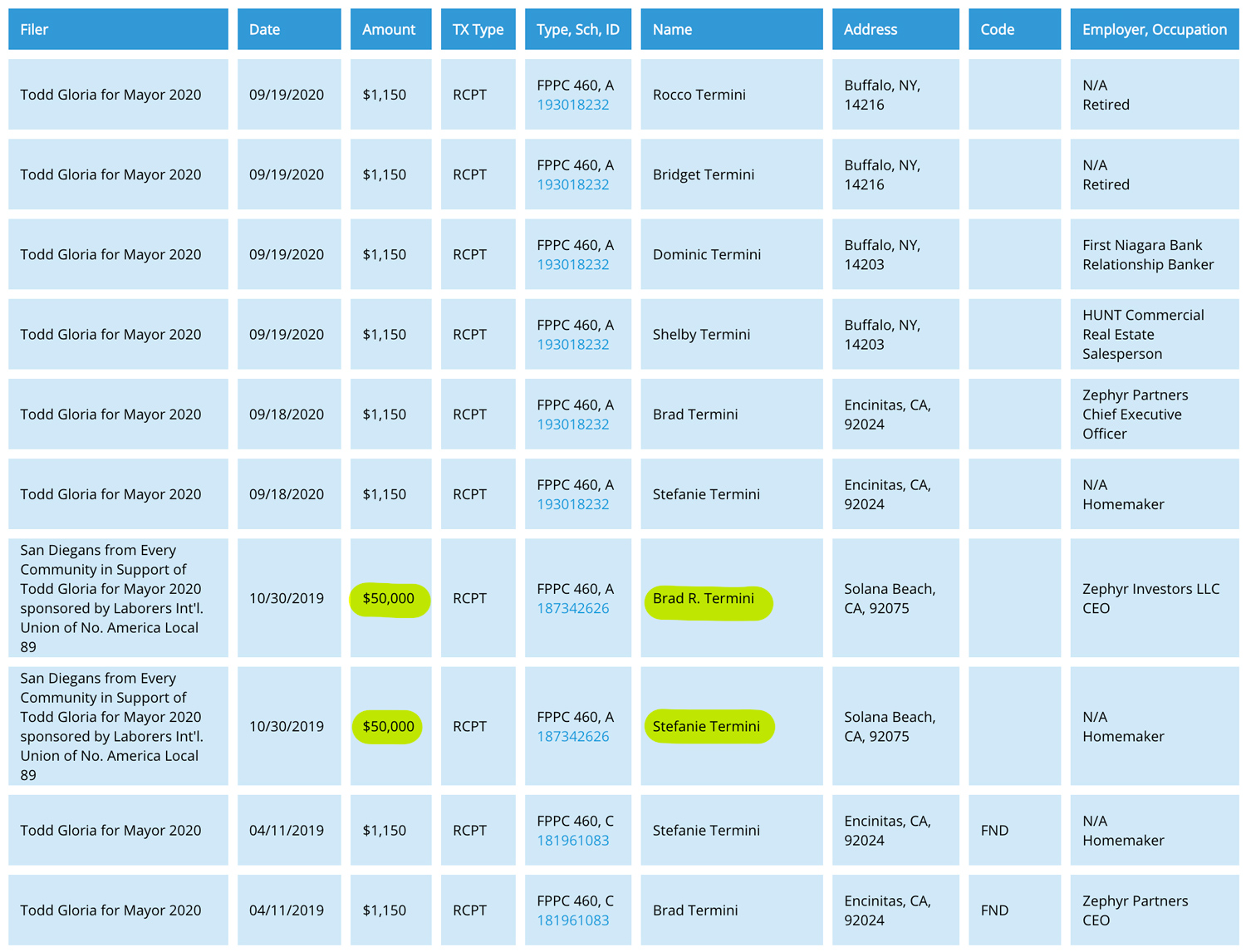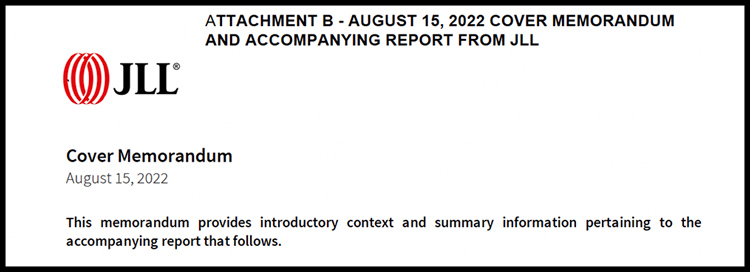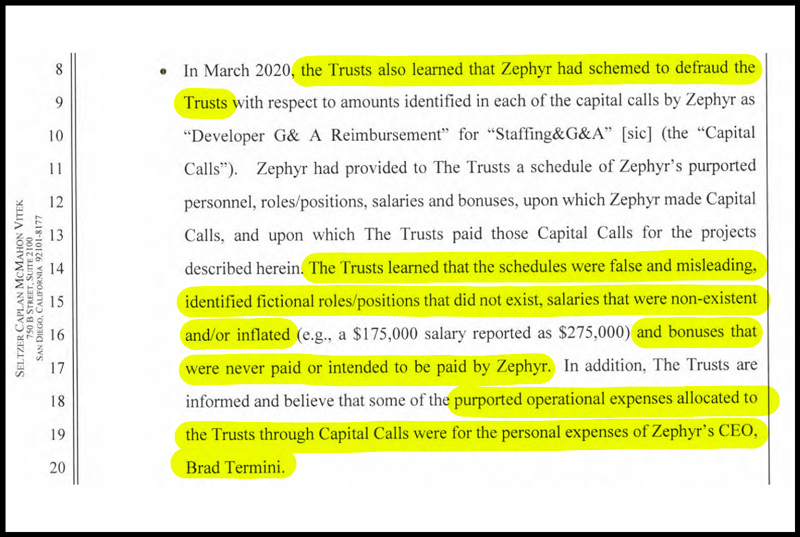SD Mayor Pushing Development Deal for Largest Contributor without Proper Review

The City of San Diego is moving quickly to approve a redevelopment project at the site of the current Sports Arena, but the process seems to be lacking proper due diligence and vetting of the Mayor’s favored developer, reminiscent of the process that led to the disastrous 101 Ash St debacle in 2016.
Mayor Todd Gloria is pushing to approve an Exclusive Negotiating Agreement (ENA) with a group known as Midway Rising, represented by principal Brad Termini of Zephyr Development.
Termini and his wife, Stefanie, were the two largest contributors to a special campaign committee created solely to support Todd Gloria’s campaign for Mayor in the 2020 election.
Brad and Stefanie Termini donated $100,000 to the committee on Oct 30, 2019. Termini is listed as the CEO of Zephyr Investors, LLC, and his wife is listed as a “Homemaker”.

Brad and Stefanie Termini also contributed a total of $4,500 directly to the Todd Gloria for Mayor campaign committee controlled by Gloria during the election cycle.
Four of Termini’s relatives in Buffalo, NY, also contributed a total of $4,500 directly to the Todd Gloria for Mayor campaign committee. Termini previously ran his family’s development company in Buffalo and recently launched a $300 million marijuana cultivation operation there.
The independent campaign committee, San Diegans from Every Community in Support of Todd Gloria for Mayor 2020 sponsored by Laborers Int'l. Union of No. America Local 89, reported receiving contributions totaling $484,071 through June 2020 when it was terminated after the 2020 Primary Election.
No other contributions matched to amount of the Terminis' individual contributions.
THE PROJECT
The selection process to choose a development company to rebuild the current Sports Arena property was first started by then-Mayor Kevin Faulconer before he left office in December 2020.
That process led to the selection of Brookfield Properties as the developer, but the state’s Department of Housing and Community Development notified the City that the selection could violate the Surplus Land Act because the City it did not properly follow the Act’s declaration and noticing procedures for developing public lands.
La Prensa San Diego has previously reported that sources claimed Faulconer had selected Brookfield for political reasons, but the state’s objections caused the process to be restarted after Gloria had already succeeded Faulconer in the Mayor’s office.
Gloria announced in June 2021 that he would restart the process to select a developer to maximize the project’s impact, especially for affordable housing.
The 48.5-acre site is owned by the City and current state law requires new developments on public lands to include a minimum of 25% of the proposed units to be affordable for tenants earning 80% of the average median income (AMI) or below, which equals about $93,700 for a family of three in San Diego.
The City received five bids and narrowed them down to three companies in May 2020: Termini’s Midway Rising was one of them, but Brookfield didn’t even make the cut.
During the review process, the City engaged JLL, a national real estate consulting firm, to help manage the selection process. JLL had previously conducted an analysis of the Sports Arena site in July 2020.
In their 2020 review, JLL issued a 22-page report that compared the two final bidders, complete with side-by-side comparisons of their respective offers, rental incomes, evaluation of responses, experience, and financial capabilities.
But in their work on the Midway project, JLL only issued a two-page "Cover Memorandum" that details the limitations of their review, and included a warning that many questions about the project "remain unanswered".

"As noted in the “Limitations” section above, at this stage of the project concept, many questions relating to project feasibility and implementation remain unanswered," JLL's memo reads.
The staff presentation made public this week lacks any specifics for financial viability or capacity, income analysis, and includes language that the "early-stage" proposals could change based on market conditions.
"As with any large-scale project, certain questions relating to feasibility and execution will remain until key milestones are completed – ground lease negotiation, design, entitlements, guaranteed maximum price contracting, and financing," the report states.
But, unlike the 2020 process, JLL was not asked to perform the same level of review of the applicants’ operating plans, personal experience and qualifications, financial capacity, and due diligence review of past legal filings as it did in 2020.
The City’s staff report concluded that, since all three applicants qualified, “first priority” would be given to the team proposing the highest number of affordable housing units.
Internal sources confirm that experienced City staff within the Department of Real Estate and Airport Management (DREAM) were not involved in the review and due diligence process which led to the recommendation of Termini’s company as the preferred developer, but that the department’s new Director, Penny Maas, drove the process nearly single-handedly at the direction of the Mayor.
Sources within the City confirm that the review process was driven more by political considerations at the direction of the Mayor’s office than by a complete review and analysis of the respondents’ projects, financing, and experience.
Staff fear that they will again be blamed for what may appear to be a lack of due diligence when, in fact, much like the failed 101 Ash process, the decisions and directives appear to be driven directly by the Mayor’s office.
City staff had previously been criticized for not conducting thorough due diligence when the City acquired the 101 Ash St building in 2016, but it was later revealed that Mayor Faulconer had given the directive to use a lease instead of a purchase simply to avoid the appearance of paying his largest contributor, “Papa” Doug Manchester.
TRANSPARENCY
In reviewing responses provided to the City by Midway Rising, Termini’s company failed to disclose relevant past lawsuits, judgements, and claims, did not provide a documented track-record of successfully developing projects of this size.
For example, in response to the City’s request for “Legal Disclosures”, Midway Rising responded with information on three past lawsuits by providing general descriptions of the matters, but did not provide dates or case numbers.
A review of Zephyr and Termini found a total of ten cases related to development projects, excluding construction defect, disputes with subcontractors, and small claims cases.
One of the three cases disclosed by Midway Rising was described in two sentences as a “partnership dispute that was successfully resolved and settled”, but the case included serious allegations against Termini and his company.
Court filings reviewed by La Prensa San Diego show that Termini’s company entered into an agreement to borrow up to $12.5 million for a commercial real estate project in downtown San Diego, and that Termini personally guaranteed the debt.
But the lender later claimed Zephyr defaulted on the loan for various reasons, including that Termini’s net worth had dropped by nearly $18 million; that he had sold interests in collateral used to secure the loan; that he delivered false, misleading, and inaccurate financial statements; and that he failed to deliver certificates for the financial statements, among other claims.
The lender went so far as to claim in court filings that Zephyr “schemed to defraud” them by using false financial statements.
“In March 2020, the Trusts learned that Zephyr schemed to defraud N4FL with respect to, among other things, the amounts identified in each of the Capital Calls by Zephyr for the Solana Partners project,” a court filing reads. “The Trusts learned that the schedules were false, misleading identified fictional roles/positions that did not exist, salaries that were non-existent and/or inflated and bonuses that were never paid or Intended to be paid by Zephyr,” the filing concludes.

Midway Rising also failed to disclose a lawsuit filed in 2020 which claimed that Zephyr failed to pay $494,400 for services on a project in Oceanside, CA, as well as a 2021 lawsuit against a wholly-owned subsidiary of Zephyr, Del Mar Beach Resort, which was hit with a default judgement but had no resources to pay the amount due.
Zephyr was the sole member LLC of Del Mar Beach Resorts, and Brad Termini was the managing member, according to the California Secretary of State’s office.
RELEVANT EXPERIENCE
Although Midway Rising’s proposal includes 4,250 residential units and a 450,000 sq. ft. arena, the company and its owner do not seem to have comparable experience in similar sized projects.
The largest project identified on Zephyr’s own company website is the 510-unit “Diega” high-rise in downtown San Diego which is still under construction, but, Zephyr’s role was to acquire the land, not develop the project. Longtime developer Bosa is the lead builder on the Diega project.
Similarly, Zephyr lists the 401-unit multi-family "Vista Melrose" project in Vista, CA, and the 542-unit “Bridges at Murrieta” multi-family project where Zephyr only sold the land to the eventual developers.
Other completed projects listed on Zephyr’s website include the 60-unit high-end condo tower called “The Park” in Bankers Hill completed in 2016, and the 168-unit “South Cove” condo development in Dana Point, CA, which only included 17 moderate income units.
Zephyr's entire list of projects combined do not total the 2,000 units proposed in the Midway Rising project.
LESSONS LEARNED FROM 101 ASH
The City just recently voted to execute an $86 million legal settlement in hopes of resolving the 101 Ash Street debacle which hung over the City for over four years.
In that case, the City entered into a 20-year lease-to-own agreement with a company that had secretly agreed to pay the City’s broker a $4.41 million backend payment. It was later revealed that Mayor Kevin Faulconer directed staff to only pursue a lease through a middleman company so it would not appear that he paid one of the building’s owners –“Papa” Doug Manchester- directly.
Manchester had been one of -if not the largest- political donors to Faulconer’s campaigns. Several high-ranking staffers who attended a meeting in Faulconer's office have testified under oath that Faulconer specifically mentioned not wanting to appear to pay Manchester directly, proving that Faulconer wanted to get millions of dollars to his largest contributor, albeit indirectly.
A 117-page report released in July 2021 by the City Audit found that the Faulconer Administration failed to conduct industry-standard due diligence in acquiring 101 Ash, and recommended a 10-step process for future building deals.
But, what the Auditor’s report did not uncover -because Kevin Faulconer and several other key figures in the 101 Ash debacle did not agree to be interviewed for the Audit- was that the staff did not simply fail to recognize the importance of conducting a thorough review, but that they were directed to execute the specific deal under the constant threat of being fired.
Several current and former staffers have confirmed that pressure is applied from the Mayor’s office, through Directors and managers, to follow the decisions made at the top, or risk being sidelined, passed over, or even fired.
The common complaint from professional City staffers is that the pressure to follow political directives as opposed to technical considerations has increased dramatically since the passage of the “Strong Mayor” form of government first approved by voters in 2004.
Before that, the City of San Diego was governed by the City Council, consisting of six Council members and the Mayor, but run on a day-to-day basis by a professional City Manager appointed by the full Council.
Under the City Manager-form of government, the entire Council gave direction to the City Manager, and it took a majority of the Council to fire the City Manager.
In 2004, a ballot measure was approved to make the Mayor the Chief Executive of the City, separate from the Council, and created a Chief Operating Officer as the day-to-day manager who reports directly to and serves at the pleasure of the Mayor, and the Mayor alone.
The impact of the decisions and direction of the Mayor were seen in the 101 Ash St debacle, and appear to be reflected in the process used so far in the Sports Arena selection process.
Much like Faulconer’s directive to move forward with acquiring 101 Ash from one of his biggest donors, it now appears that Gloria is pushing for the selection of the single-largest personal contributor to his campaign who may have failed to fully disclose pertinent information and also lacks a proven track-record of development projects of the magnitude of the Midway proposal.
NEXT STEPS
The Mayor’s proposal to enter into an Exclusive Negotiating Agreement with Midway Riding is now scheduled to be heard by the City Council’s Land Use and Housing Committee on Sept 8th. If passed, staff expect the proposal to go before the full Council the following week.
City insiders admit that the staff, and even Councilmembers, are careful not to object or oppose recommendations proposed by Gloria because he seems to have strong political relationships, fundraising ability, and momentum.
After the approval of the 101 Ash Street legal settlement, which even City Attorney Mara Elliott publicly opposed, sources say Councilmembers are reluctant to oppose Gloria on his requests
High-ranking officials and staffers claim that Councilmembers who supported the 101 Ash Street settlement have benefited politically from Gloria, while some who opposed the deal have been marginalized.


 Alberto Garcia
Alberto Garcia




